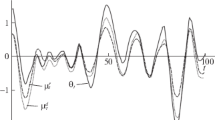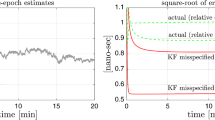Abstract
The recursive least-square (RLS) algorithm has been extensively used in adaptive identification, prediction, filtering, and many other fields. This paper proposes adding a second-difference term to the standard recurrent formula to create a novel method for improving tracing capabilities. Test results show that this can greatly improve the convergence capability of RLS algorithms.
Similar content being viewed by others
References
BROCKWELL P J, DAVIS R A. Time series: theory and methods[M]. New York: Springer-Verlag Inc, 1991.
SUN Jinghua, JIN Lijun. Application of several improved RLS algorithms in adaptive filter system[J]. Journal of Chongqing University of Posts and Telecommunications, 2003, 15(3): 14–17(in Chinese).
WU Qihui, WANG Jinlong, SHEN Liang, et al. Robust RLS algorithm for adaptive arrays[J]. Acta Electronic Sinica, 2002, 30(6):893–895(in Chinese).
LI Jing, WANG Shuxun, WANG Fei. Parameter estimation of adaptive chirp signal based on polynomial phase transforms[J]. Journal of Jinlin University, 2004, 34(4):617–621(in Chinese).
PARK D, JUN B E. Self-perturbing recursive least squares algorithm with fast tracking capability[J]. Electronics Letters, 1992, 28(6): 558–559.
JIANG J, COOK R. Fast parameter tracking RLS algorithm with high noise immunity[J]. Electronics Letters, 1996, 28(22): 2043–2045.
EOM K, PARK D. Fast tracking and noise-immunized RLS algorithm based on Kalman filter[J]. Electronics Letters, 1996, 32(25):2311–2312.
SO C F, NG S C, LEUNG S H. Gradient based variable forgetting factor RLS algorithm[J]. Signal Processing, 2003, 83: 1163–1175.
Author information
Authors and Affiliations
Additional information
LI Tian-Shu was born in 1965. He earned his doctorate from Harbin Engineering University. His current research interests include time series predictions, support vector machines, chaos theory, etc.
TIAN Kai was born in 1972. He is an Associate Professor at Harbin Engineering University. His current research interests include power systems, time series predictions, etc.
Rights and permissions
About this article
Cite this article
Li, Ts., Tian, K. & Li, Wx. Method for improving RLS algorithms. J. Marine. Sci. Appl. 6, 68–70 (2007). https://doi.org/10.1007/s11804-007-5077-x
Received:
Published:
Issue Date:
DOI: https://doi.org/10.1007/s11804-007-5077-x




